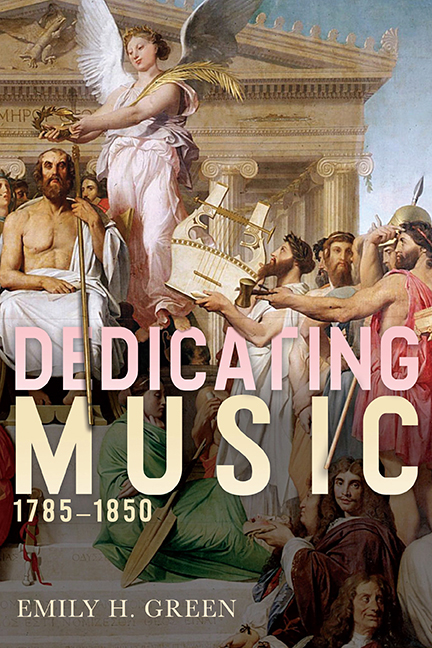Book contents
- Frontmatter
- Dedication
- Contents
- List of Illustrations
- Acknowledgments
- Introduction: Encountering Dedications
- Part One Maintaining Early Modern Models
- 1 Gifting a Commodity
- 2 Selling a Gift
- Part Two Commodifying the Composer
- Epilogue: Dedications and Romanticism
- Appendix: Dedicatory Epistles
- Notes
- Bibliography
- Index
2 - Selling a Gift
from Part One - Maintaining Early Modern Models
Published online by Cambridge University Press: 03 September 2019
- Frontmatter
- Dedication
- Contents
- List of Illustrations
- Acknowledgments
- Introduction: Encountering Dedications
- Part One Maintaining Early Modern Models
- 1 Gifting a Commodity
- 2 Selling a Gift
- Part Two Commodifying the Composer
- Epilogue: Dedications and Romanticism
- Appendix: Dedicatory Epistles
- Notes
- Bibliography
- Index
Summary
Nay, to deal ingenuously with your Lordship, had I not known you to be rich, I should perhaps never have known you to be noble, and then your Lordship and I should never have been Patron and Client, nor Mankind been instructed in your character.
—Thomas Gordon, A Dedication to a Great Man, Concerning DedicationsIn the changing economic climate of the early nineteenth century, the German composer Andreas Romberg wrote a striking letter to his publisher (quoted in other chapters here):
Bernhard [Romberg, Andreas's cousin] has dedicated three quartets to Haydn that have just been published here [in Paris]. I too want to dedicate three quartets to Haydn, and they should be yours [to publish]. Begin right away with the engraving, and leave a page free in the first violin part for the dedication, which I will send you in due course. This dedication will surely not be unappreciated by you, as it will doubtless promote the sale of the works. Now tell me if we don't understand our public—or rather, the world!
What Romberg understands about the world—his world—is that the semblance of servitude, even to another composer, serves a promotional purpose. Romberg, writing in 1801, lays bare the falseness of the modesty inherent in dedications; rather than ask Simrock that his works receive a modicum of attention, he baldly proclaims that a public reference to Haydn will be profitable. The tone is all the more striking because it is so much the opposite of typical dedicatory language (demonstrated in chapter 1). Nearly thirty years later, Friedrich Kuhlau similarly asked the publisher Peters, in Leipzig, to include a dedication to “his friend,” the organist and teacher Albert Gottlieb Methfessel, because he claimed it would improve sales. We can assume that Simrock and Peters agreed with these composers’ bold predictions because they did print the dedications as requested—and we can also assume that many publishers in this period thought similarly of dedications, as they maintained the early modern practice of highlighting dedicatees typographically on the title page, evident through the 1840s when Felix Mendelssohn published his string quartets opus 44 (figure 2.1).
- Type
- Chapter
- Information
- Dedicating Music, 1785–1850 , pp. 77 - 106Publisher: Boydell & BrewerPrint publication year: 2019



